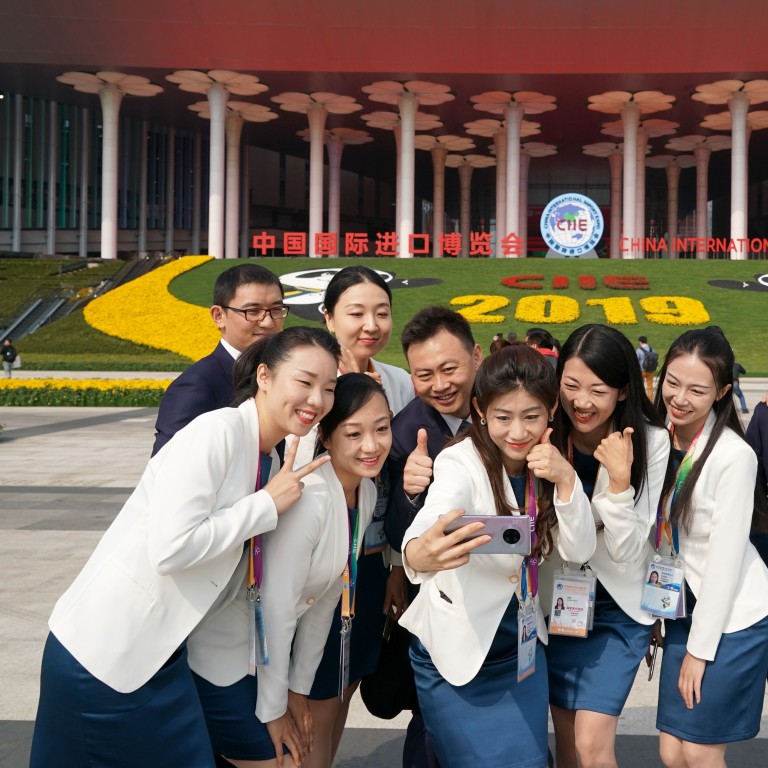
As Shanghai gets ready to host second import expo, EU business chamber says half of deals signed last year were not executed
- Survey by European Union Chamber of Commerce in China suggests 47 per cent of the deals closed by member companies last year were not realised
- ‘We expect this year’s event to be supplemented by concrete measures,’ chairman says
About half of the deals signed by European businesses during the first China International Import Expo (CIIE) last year have not been executed, according to a survey by the European Union Chamber of Commerce in China that casts a shadow over the second edition starting in Shanghai on Tuesday.
Results of the poll, released on Monday by the chamber’s Shanghai chapter, suggest 47 per cent of the deals closed by member companies at the expo last year were not realised. The chamber did not reveal the names of the Chinese companies that did not fulfil their commitments, or the value of unrealised deals.
“We expect this year’s event to be supplemented by concrete measures to facilitate further market opening and increase foreign investment,” said Carlo Diego D'Andrea, the chamber's Shanghai chairman. “We want to see notable progress in providing European companies with the same unrestricted access to Chinese markets with their Chinese counterparts [enjoy] in the EU.”
This year’s event, being held between November 5 and 10, is expected to have a larger scale, with more exhibitors than last year. Last year, the expo drew about 3,600 companies from 172 countries, regions and international organisations. The showcase was spread across 270,000 square metres.
China’s ministry of commerce has yet to announce numbers for this year’s event, but it did say the expo area had increased to 330,000 square metres, while more than 500,000 visitors – doubling last year’s tally – were expected at CIIE this year.
The number of participating companies from Hong Kong has also increased, by 40 per cent, since last year, said Sun Chenghai, deputy director of the CIIE Bureau, a unit of the ministry, adding that their footprint has also increased by 60 per cent this year. About 200 Hong Kong exhibitors are expected this year and will showcase their products, technology and services over 22,000 square metres of space.
Last year, import deals worth US$57.8 billion were signed during the first expo, according to official data, but many have since questioned the truthfulness of this number. Many of the deals signed during the CIIE last year had been agreed in advanced and were announced at the event to ensure it received better exposure, according to official sources.
Mainland companies were encouraged to sign as many deals as possible to add lustre to the expo, exhibitors and visitors said during interviews during the event last year. In fact, the chamber last year, citing an anonymous survey respondent, said a deal signed was just a “symbolic agreement”.
The chamber’s survey contradicts an official statement by China’s ministry of commerce, which said most deals had been fulfilled, with only a small number still being processed.
But the event remains a good opportunity for networking and promoting businesses – the chamber said 79 per cent of members who attended the expo last year will return for this year’s event.
The CIIE will become a benchmark of China’s openness, Wu Qisheng, a researcher with Shanghai Academy of Social Sciences, a local government think tank, said. “CIIE, in general, is a platform to better connect China’s market with foreign businesses and funds. Many foreign exhibitors, who have already secured a foothold in the Chinese market, expect widened access to the market to profit more from the economy.”
Hong Kong companies throw their hats into ring at Shanghai’s import fair
He added that the opening up of the mainland China market would not live up to foreign investors’ expectations overnight.
The survey ratchets up pressure on Beijing to take more substantial steps towards attracting international business partners and investors.
The expo is not only viewed as a trade fair that encourages Chinese companies to buy foreign goods and services, but also an event that highlights Beijing’s willingness to open up the vast mainland market to foreign firms amid the US-China trade war.
China touts US$57.8 billion deals after Shanghai import expo
During the first edition’s launch last year, Chinese President Xi Jinping pledged to further open the country’s financial markets, reduce barriers for foreign direct investment and facilitate cross-border trade, as he described the Chinese economy as a sea that had successfully withstood numerous storms.
Xi will make a keynote speech at the expo’s opening on Tuesday. Several European leaders, including French President Emmanuel Macron and Phil Hogan, the incoming trade commissioner, will visit the CIIE as the EU continues to push for a trade and investment agreement. They are expected to lobby for the completion of the Comprehensive Agreement on Investment, which has been under review for six years.
Elsewhere, On Monday, DHL Global Forwarding and Xi’an International Inland Port Investment & Development Group launched the fastest rail service from Xi’an in China to Hamburg and Neuss in Germany, cutting transit time from 17 to between 10 and 12 days. The new express rail service along the 9,400km route is expected to boost trade between the two economies, with daily trade value averaging at €1 billion (US$1.12 billion).

